The HyperTexts
WILLIAM BLAKE: POET AND ARTIST
William Blake may have been the greatest poet/artist of all time. Blake was
a major influence on Bob
Dylan, Joan Baez, John Lennon, Paul McCartney, Mick Jagger, Jim Morrison, Van
Morrison, Patti Smith, Neil Young, Robert Plant, Bono, Bruce Dickinson, Kris
Kristofferson, Thom Yorke, Walt Whitman, William Butler Yeats, James Joyce, T.
S. Eliot, Allen Ginsberg, Pablo Neruda, Salman Rushdie, Jackson Pollock, Philip
Pullman and many other
poets, writers, artists and singer/songwriters. Blake's visual art has been a
major
influence on fantasy art and the graphic novel. Perhaps most importantly,
Blake was the first great anti-establishment poet/artist to question the reigning orthodoxy of church,
state and industry (which he called the "Satanic Mills"). Blake may also have been the first major
English Romantic poet, and the first major
English free verse poet as well. He was also an early advocate of racial
equality and women's rights. William Blake was a man far ahead of his time and—apparently—still
ahead of ours.
This page of William Blake's poems, prose, art, engravings, epigrams, quotations
and criticism was compiled by Michael R. Burch
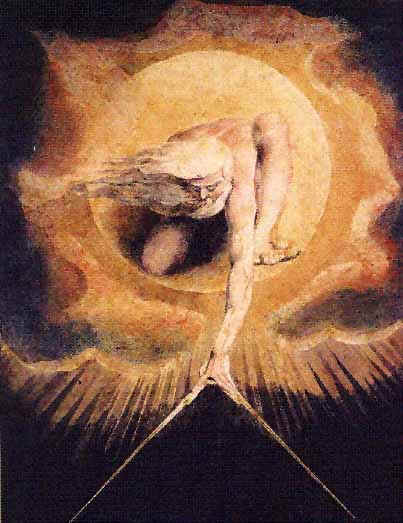
William Blake's "Ancient of Days"
William Blake is best known today for his early and highly influential Romantic
poetry collections, Songs of Innocence and Songs of Experience,
which contain well-known poems such as "The Lamb" and "The Tyger" with corresponding engravings.
Demonstrating Blake's lasting popularity
and impact, "The Tyger" is the most anthologized poem in the English language. While it has been
called "a hymn to pure being," the poem raises a
question: What sort of Creator would fashion an innocent,
defenseless lamb and a ferocious predator to prey on it? The poem also has
religious implications, since Jesus Christ was called the Lamb of God and
the Lion of Judah.
Blake may have been both England's
greatest heretic and its greatest visionary prophet. Together with Dante and Milton, Blake
completes a Trinity of great Christian poets, even though none of them
were Christians in the orthodox sense. (Dante claimed to be saved by his lover
Beatrice and the pagan poet Virgil; Milton rather, than justifying the ways of
God to man, made Jehovah seem like an unjust tyrant while turning Lucifer, Adam and Eve
into Romantic heroes for
the ages; Blake denied the need for anyone to save him, least
of all the biblical god, whom he called "Nobodaddy.")
I believe the
case can be made that Blake was England's greatest poet/artist, and perhaps the
world's. In another Trinity, along with Michelangelo and Dante Gabriel Rossetti,
Blake is one of three great visual artists
who were major poets. But Blake ranks higher than either Michelangelo or Rossetti as
a poet, so he deserves strong consideration as the most important poet/artist of all time. And when his influence on
modern-day poets, songwriters, artists, filmmakers, novelists, cartoonists, graphic novelists, peace activists and child advocates is considered, a
good case
can be made for calling Blake the
most influential reformer of all time. After all, he was the first
genius to turn poetry and art into ideological weapons to be raised
defiantly against the establishment, making him a prime gladiator in the arena of
social change. Blake was the Thomas Paine, Thomas Jefferson and George
Washington of counter-culture, anti-establishment poetry
and art. He was a one-man revolution: a poetic James Dean, the original "Rebel
with a
Cause." Blake thus became a major influence on
poets like Walt Whitman, William Butler Yeats and Alan Ginsberg and
singer-songwriters like Bob Dylan, John
Lennon, Patti Smith, Kris Kristofferson, Joan Baez, Joni Mitchell and Bono. Jim
Morrison and the Doors named their group after Blake's "Doors of Perception."
Hell, even the best-known modern apologist for orthodox Christianity, C. S.
Lewis, called Blake a "great genius" despite his blatant heresies. In yet another
wonderful irony, Blake's stirring poem "Jerusalem" became a well-loved Christian
hymn. It's one of my mother's favorites. When she discovered it missing from a
Baptist Hymnal (which ironically ends with hymn number 666), she added it to the
inside of the back cover, by hand.
Furthermore, I think the case can be made that Blake was the first great
Modernist poet, because (1) he broke with many traditions of the past, including
orthodox Christianity and the ideas that "god" and nature are "good" and to be praised; (2) he innovated, writing free
verse while also employing slant rhymes and metrical variations in his more
formal poems; (3) he greatly expanded the themes and subjects of poetry to
include free love, equality of the races and sexes, etc.; and (4) he focused on the individual (primarily himself) and the human
imagination and consciousness, blazing a trail for highly individualistic and idiosyncratic poets
to come, such as Walt Whitman, Emily Dickinson, William Butler Yeats, Ezra
Pound, T. S. Eliot, Hart Crane, Wallace Stevens, W. H. Auden, Allen Ginsberg,
Pablo Neruda, e. e. cummings, Bob
Dylan, John Lennon and Jim Morrison. It is my contention that William Blake was
the first and greatest of the English Romantic poets, and that he was also the first and
greatest poet of English Modernism. Before Whitman made a myth of himself, Blake
had already made a myth of himself. Before Ezra Pound raised the cry to "Make it new!"
the eclectic Blake had already made everything new. Before T. S. Eliot painted
the modern industrialized world as a wasteland, Blake had already described the
dark Satanic mills of church, state and industry. In each of the major areas of
modernism that I mentioned above, William Blake came first. And while his main
competitors for the mantle of the first poet of English modernism may have
claims here and there, Blake was also a highly original visual artist
and inventor. He was "making it new" across the board. Today we see his
influence in modern poetry, music, songwriting, painting, engraving, graphic
novels, Gothic art, fantasy art, album covers, comics, movies, television, video
games ... everywhere really.
Related pages: The Best Poems and
Art of William Blake, William
Blake's Children, William Blake's
Angels, William Blake's God,
William Blake's Jesus Christ,
William Blake's
Genius and Originality,
William Blake's "Broken Love"
![[Blake Print - Hecate]](images/William%20Blake%20Hecate.jpg)
William Blake's "Hecate"
If you want to explore Blake's influence further, please click this link:
WILLIAM BLAKE: Influence and References in Popular Culture.
If you prefer to concentrate on his work, please continue reading this page.
Blake was the first artist to graphically depict the horrors of slavery ... you
can see a slave ship departing in the background ...
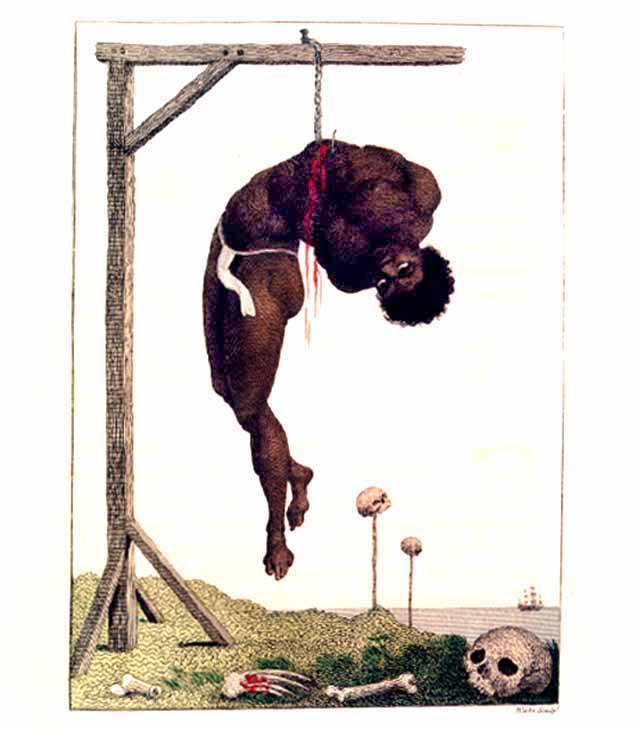
William Blake's "A Negro Hung Alive"
As I worked on this page, the lines of a song started playing in my
head: "Free your mind and the rest will follow. / Be colorblind. Don't be so
shallow." This call to enlightenment and tolerance by changing one's own mind
can be traced back to the visions of William Blake, who claimed to speak to
angels and called for a "Mental Fight" against the
dark forces ("Satanic Mills") of blind faith, ignorance, superstition, racism,
chauvinism and imperialism. A similar song that Blake might have inspired or
influenced is Michael Jackson's "Man in the Mirror."
William Blake was a student of the Bible, but a fierce critic of the black-robed priests of Orthodoxy who
condemned human beings to "hell" in the name of God. Today it seems Blake has been vindicated. The Bible published by the Roman
Catholic Church, the New American Bible Revised Edition, doesn't contain a single mention of the word "hell." The Holman Christian
Standard Bible, published by the famously literal Southern Baptist Convention, barely mentions "hell." If this interests
you, please read why "hell" is vanishing from the Bible.
The Sick Rose
by William Blake
O Rose, thou art sick.
The invisible worm
That flies in the night
In the howling storm
Has found out thy bed
Of crimson joy,
And his dark secret love
Does thy life destroy.
According to Blake, human society and its institutions were sick, and the cure
required a combination of revelation, imagination, right thinking, compassion,
fierce tenacity and love. He believed the black-robed priests of religion had
nailed a "thou shalt not" sign over the garden of earthly delights, robbing
adults of pleasure and children of hope. He vowed to not let his pen rest in his
hand until he had won the "Mental Fight" to transform the dreary London of his
day into a new Jerusalem. Today, as we witness the suffering inflicted on
innocent children all around the globe in the name of state, industry and
religion, it behooves us to consider joining that Mental Fight on the side of
Blake and his Rebel Angels.
Ah! Sunflower
by William Blake
Ah! sunflower, weary of time,
Who countest the steps of the sun,
Seeking after that sweet golden clime
Where the traveller’s journey is done;
Where the youth pined away with desire,
And the pale virgin shrouded in snow,
Arise from their graves and aspire;
Where my sunflower wishes to go.
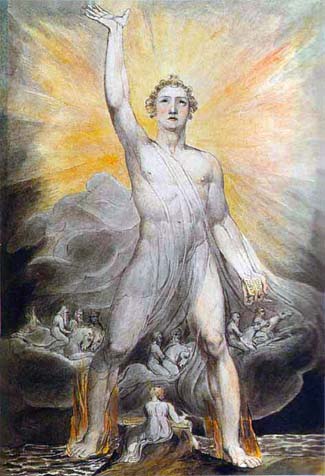
William Blake's "Angel of Revelation"
![[Blake Print - Angels Hovering Over the Body of Jesus in the Sepulchre]](images/William%20Blake%20Angels%20Hovering%20Over%20the%20Body%20of%20Jesus%20Christ.jpg)
William Blake's "Angels Hovering Over the Body of Jesus Christ in the Sepulcher"
![[Blake Print - Jacob's Ladder]](images/William%20Blake%20Jacobs%20Ladder.jpg)
William Blake's "Jacob's Ladder"
Blake's Importance
In my opinion William Blake (1757-1827) is the most important poet of all time. Why? Because
he helped change the world and in changing the world he saved many innocent children
from lives of drudgery and misery terminated by premature deaths. While he wrote many
wonderful poems and was also a talented painter, printer and engraver, what
makes Blake the most important of poets and artists is the change his work wrought in human
hearts, minds and consciences. No great poet ever wrote more compassionately (or more
frequently) about children. For instance, take this poem of Blake's, one of
the loveliest lullabies in the English language:
Cradle Song
Sleep, sleep, beauty bright,
Dreaming in the joys of night;
Sleep, sleep; in thy sleep
Little sorrows sit and weep.
Sweet babe, in thy face
Soft desires I can trace,
Secret joys and secret smiles,
Little pretty infant wiles.
As thy softest limbs I feel
Smiles as of the morning steal
O'er thy cheek, and o'er thy breast
Where thy little heart doth rest.
O the cunning wiles that creep
In thy little heart asleep!
When thy little heart doth wake,
Then the dreadful night shall break.
Only Michelangelo ranks with William Blake, among great artists who also wrote superior poetry,
in combined achievement. But Michelangelo didn't rock the civilized world to its
foundations the way Blake did, so Blake also gets my vote as the most important
artist of all time.
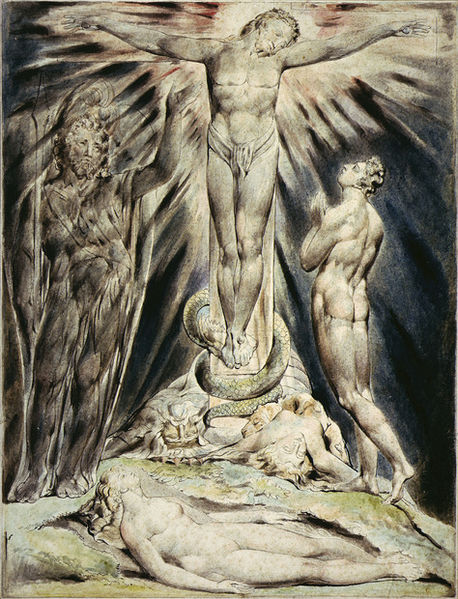
William Blake's "Michael Foretells the Crucifixion"
How, exactly, did Blake rock the foundations of the world? By being a social critic and reformer akin to the
Hebrew prophets. Here, for instance, is his bleak vision of the London of his day:
London
I wander thro' each charter'd street,
Near where the charter'd Thames does flow,
And mark in every face I meet
Marks of weakness, marks of woe.
In every cry of every Man,
In every Infant's cry of fear,
In every voice, in every ban,
The mind-forg'd manacles I hear.
How the Chimney-sweeper's cry
Every blackning Church appalls,
And the hapless Soldier's sigh
Runs in blood down Palace walls.
But most thro' midnight streets I hear
How the youthful Harlot's curse
Blasts the new-born Infant's tear
And blights with plagues the Marriage hearse.
Here, as in other of his poems, Blake reveals the schizophrenia of a society of
Bible-believing, church-going adults who inexplicably allowed children to work
as chimneysweeps: an always-dangerous, sometimes-deadly occupation. Today's
children of Gaza can no doubt sympathize with defenseless English children who
suffered and died in the shadows of those despicable churches. While Jews and
Christians raise hymns to God, and elect themselves the "Chosen Few,"
completely innocent Palestinian children live in abject fear and misery. Like
Blake, I find that appalling.
If you are a student, teacher, educator, peace
activist or just someone who cares and wants to help, please read
How Can We End Ethnic Cleansing and Genocide Forever?
and do what you can to make the world a safer, happier place for
children of all races and creeds.
Blake was also a fierce critic of
what Dwight D. Eisenhower would later call "the military-industrial complex." Blake
had a more evocative term for factories that churned out implements of war
and death: "Satanic mills." Blake is thus the forefather of virtually
every singer-songwriter who ever wrote a protest song. Before Blake, few poets
and minstrels had the nerve to criticize church and state. After Blake, many of
them would come to consider dissent a sacred task. Songwriters who followed in Blake's
footsteps as critics of the military-industrial complex include Woody Guthrie,
Peter Seeger, Bob Dylan, John
Lennon, Joni Mitchell, Joan Baez, Jim Morrison, Marvin Gaye, Billy Joel and Bruce Springsteen.
Blake's Continuing Influence
According to Narelle Doe, "Blake
still influences contemporary creativity and ideas. He is seen by many as one of
the great synthesisers of cultural experience, attracting a myriad of followers
with interests ranging from literature, painting, book design, politics,
mysticism, philosophy, mythology through to music and film making ... John
Everett Millais, Dante Gabriel Rossetti and G. F. Watts are just some of the
Victorian artists [influenced by Blake] ... From the 1960s onward, writers,
musicians and film makers like Allen Ginsberg, Bob Dylan, Jim Morrison of the
Doors and John Lennon adopted Blake as a mystical seer and anti-establishment
activist." Blake's influence on modern art can easily be discerned in "The Goblin"
(immediately below) and in the following images, which have obviously inspired
multitudes of comic book artists and graphic novelists. And it seems safe to say
that the illustrators for the Lord of the Rings, Conan the
Barbarian and similar books have also been heavily influenced by William
Blake.
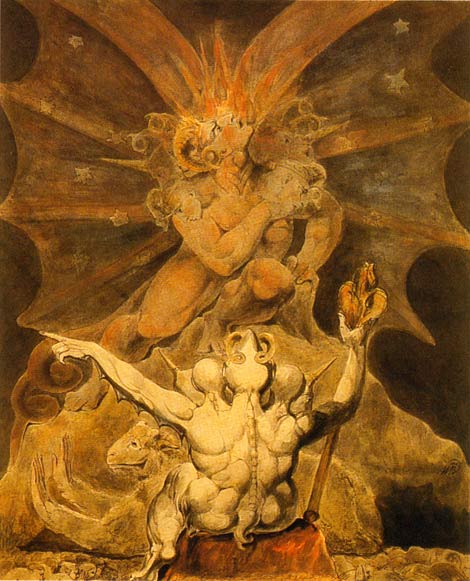
William Blake's "The Number of the Beast is 666"
How influential did Blake become? According to John Lennon's FBI files, when the
"fantastically nervous" Beatles met Bob Dylan for the first time and there was
an uncomfortable initial silence, broken by Lennon snarling an insult at Allen Ginsburg, the unperturbed
Beat poet plopped himself down in Lennon's
lap, looked up and asked him, "Have you ever read William Blake, young
man?" Lennon, in his best "Liverpudlian deadpan" replied, "Never heard of the
man." But his wife Cynthia chided him, "Oh, John, stop lying!" and that "broke the ice."
It's interesting that Blake was the first "connection" and "ice breaker" between Dylan, Lennon and
Ginsburg. Why did such super-hip modern dissident artists admire Blake? Perhaps because they were idealists longing for Utopia (or, at the
very least, for radical social change) and Blake had urged his readers to cast off the "mind-forged
manacles" of hidebound religious and political thinking, in order to
change the dreary London of his day into a Mecca he called Jerusalem:
Jerusalem
And did those feet in ancient time
Walk upon England's mountains green?
And was the holy Lamb of God
On England's pleasant pastures seen?
And did the Countenance Divine
Shine forth upon our clouded hills?
And was Jerusalem builded here
Among these dark Satanic mills?
Bring me my bow of burning gold:
Bring me my arrows of desire:
Bring me my spear: O clouds unfold!
Bring me my chariot of fire.
I will not cease from mental fight,
Nor shall my sword sleep in my hand
Till we have built Jerusalem
In England's green and pleasant land.
Please note that Blake said "till we have built
Jerusalem."
Blake's "Jerusalem" is based on the legend that Jesus once visited England as a
boy or young man. But what is most
surprising about the poem is Blake's activism. He didn't just mope and complain
about the problems he saw: he called for his spiritual and intellectual
weaponry, vowing not to let his "sword" (i.e., his pen) sleep in his hand
until London had become the new Jerusalem. The poem was later turned into a
stirring hymn (one of my mother's favorites):
Blake and Social Progress
When I say that Blake was the most important poet and artist,
I am not suggesting that he wrote the greatest poems or created the
greatest works of visual art. What I am suggesting is that Blake had the most influence on other poets and artists, and on the
greater world, especially in terms of social progress. Much of the world's progress
depends on how it treats children, because they form the foundation of each new
generation of human beings. So Blake's advocacy of children's rights, at a time
when many children were treated like slaves (or were slaves) was of prime
importance in the development of the modern world.
Was Blake successful? Indeed, because today we have child labor laws, and most
children in Western nations don't get "real jobs" until age eighteen or older.
This gives them a considerable amount of time to play and learn, before they
assume adult responsibilities. Of course Blake was not the only child advocate among writers
and artists. Charles
Dickens was obviously also very influential, as were other influential
reformers. But Blake preceded Dickens by more than half a century, and when
Dylan met Lennon, they discussed Blake, not Dickens. Blake was the
first great writer to make children's rights a primary focus of his work. I
love and admire him for that. And as we will see together, he was also one of the first
abolitionists, creating some of the first graphic images of the horrors of
slavery.
W. H. Auden once said that "poetry makes nothing happen." But
if we consider the Bible to be poetry and the Hebrew prophets to be poets (much
of the Bible was recorded originally as poetry), it becomes obvious that a certain type of poetry can certainly
make all sorts of things happen. And of all the major Western poets, Blake comes closest to
the Hebrew prophets in demanding repentance and social reform.
The Tenderness, Passion and Intellectual Energy of Blake
Blake was also unique among Western poets in that he was writer of surpassing
tenderness and yet was able to summon and channel tremendous passion and
intellectual energy. Other poets may have been as tender: Robert Burns and
Auden, for instance. Other poets may have "channeled fire," as did Dante,
Shakespeare and Milton. But few poets have combined such tenderness and
passionate energy (although Walt Whitman, e. e. cummings and Hart Crane come to
mind as heirs of Blake in this regard). Of the poets who followed Blake, Whitman
seems closest to him in spirit and message. Of the poets who preceded him, the
Hebrew prophets and Milton seem closest to Blake.
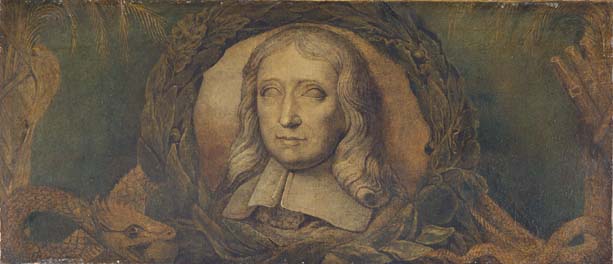
William Blake's "Portrait of Milton"
Poetic Force
Newton's equation tells us that force is the product of mass and
acceleration: a truck travelling at sixty miles per hour has much more force
than a feather pillow travelling at sixty miles per hour. I believe a similar
law applies to poetry. Poetic force is the product of mass (audience) and
acceleration (excitement or movement). A poet who excites and moves only a few readers
doesn't have as much poetic force as a poet who excites and moves larger
audiences. Hart Crane and Wallace Stevens were undoubtedly great poets capable of
tremendously exciting and moving audiences, but today those audiences are
relatively small. Homer, Shakespeare and Milton have excited and moved much
larger audiences: hence they have more poetic force. But audiences moved by
Homer, Shakespeare and Milton don't usually put down their poems and decide to
change the world. People who read Blake's work and took it to heart, sometimes did.
So I consider Blake a poet of great force, in terms of social change. Other
poets who have affected large audiences in the realm of social change include
Walt Whitman, Wilfred Owen, Bob Dylan and John Lennon. If we include poetic
sermons and speeches, Dr. Martin Luther King Jr. and Abraham Lincoln would also
make the first rank of such poets of social change.
Blake, the Prophet
To find a visionary as revolutionary as Blake, we would have to consider the
major prophets of various religions, but in many cases their words have been
altered for nefarious purposes (for instance, by charlatans who purport to
"save" human beings from an illusory "hell" in order to acquire fame, fortune
and power for themselves). But because Blake engraved and printed his own work,
we have his thoughts in an unadulterated form. He virtually left us his words
carved in metal. And one of the best things we know about William Blake is that
he was a consistently fierce but tender advocate of the rights of children not
to be used, abused or ignored by adults.
Today I believe we need another William Blake: someone who can
touch our hearts, prick our consciences, and convince us that a world where the children of
Gaza are being collectively punished for the "crime" of having been "born wrong" requires us to join
in the great "Mental Fight" to save them. Therefore, I have dedicated this essay
on my favorite poet to the children of Gaza. We shouldn't need poets to persuade
us to do what we should want to do voluntarily out of love, compassion
and simple humanity, but a study of history reveals that at certain times human beings
have needed a Blake or a Harriet Beecher Stowe or a Lincoln or a Gandhi or a Dr. Martin
Luther King Jr. to shock them out of their lethargy and apathy.
The Uniqueness of Blake
But in many ways Blake was first, and unique. He was the most visionary,
mystical and prophetic of the major Western poets. And he appeared at just the
right moment in time to become tremendously influential in changing the way
people thought, because during his lifetime more and more people were beginning to
question the "infallibility" of the Bible and the "divine right of kings."
According to the Bible, (1) kings were appointed by God, (2) women and
children were ordained by God to be subservient to men, (3) sex was
"evil" unless sanctioned by marriage, and (4) serfdom and slavery had been
instituted by God and Moses. But the Bible was like a house of cards. If a
single verse could be proven incorrect, then it was up to human beings to decide
which verses to believe, if any. As science proved one biblical "fact" after
another to be incorrect, the authority of the Bible was undermined and the house
of cards began to collapse. Free thinkers began to interpret the Bible as they
preferred, either ignoring or "rehabilitating" verses that offended them, or in some
cases becoming agnostics and atheists.
Suddenly it became possible to reject the orthodox ideas that extramarital sex
was "evil," that kings and lords had the "right" to use and abuse serfs,
that men had the "right" to use and abuse women and children, and that some men
had the "right" to own other men. If God had not
uttered every word of the Bible infallibly, or if parts of the Bible had been
"doctored" by men, then people had to listen to their own hearts and minds, interpret
what they read, and draw their own conclusions. But of course this was the last
thing kings, lords, and the clergy wanted. So the forces of orthodoxy began to
confront these strange new ideas of individual interpretation and freedom of
conscience. Chaos and revolution were in the air. Poets, writers and artists
would greatly influence how the "people in the streets" came to think, and act.
The initial poetic dissent may have originated with John Milton, who in trying to
"justify the ways of God to man" had turned Satan, Adam and Eve into rebellious
heroes for the ages. Blake, an intuitive genius, once remarked that Milton was
of the "Devil's party" without knowing it, which Blake intended as a compliment.
However, Blake didn't see God as the enemy, but rather organized religion, which
according to him had
subverted true religion, which he saw personified in Jesus Christ. If organized
religion was the enemy, then perhaps Milton's rebellious "fallen" angels were
freedom fighters, like the American and French revolutionists. But Blake was a
compassionate man who abhorred violence and when he saw the terrible excesses of
the French Revolution, he soon distanced himself from men like Robespierre.
Poets and artists, for the most part, would come to advocate methods of social
change that did not involve violence, torture, murder and war. There would be a
progression of thinking from Blake/Wordsworth/Shelley to Emerson/Whitman
/Thoreau to Gandhi/King/Mandela to Dylan/Lennon/Baez that might be summed up in
these words from a Beatles song: "You say you want a revolution? We all want to
change the world. But if you talk about destruction, don't you know that you can
count me out? You know it's gonna be ... alright." This idea that the world
could be transformed through a revolution that did not involve violence and
would lead to a day when things would be "alright" has its genesis in the work
of Blake, as we shall see together ...
Blake, the Satanist?
While Blake has been accused of being a "Satanist," I don't think that's
strictly true. Blake was so strongly opposed to the errors of orthodox Christianity that
he believed rebellion was necessary. And he seemed to believe, as many mystics
do,
in the "inner light" or the "Christ within." He may have
seen man as both Christ and Satan, with Christ representing purity and
innocence, and Satan representing experience. But I see no evidence that
Blake "worshipped" either Christ or Satan, in the sense of bowing down to them and
pledging allegiance. For Blake religion was more a matter of transformation
and becoming, than a matter of theology. As with many mystics, it seems
likely that Blake thought of the Christ within himself, not as some remote
figure to "believe" in and fawn over.
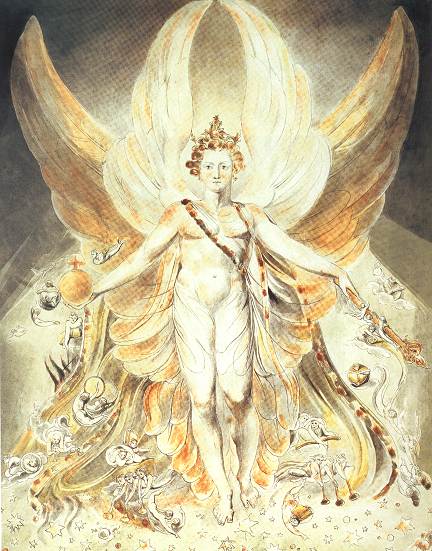
William Blake's "Satan in Glory"
Blake seemed to either believe or at least "work from" the Biblical account of
God creating Adam and Eve, after which some sort of sexual imbroglio involving
Satan resulted in the "fall." At least the images below suggest something along
those lines. In the first image, the Creator prays and/or rests after having created
the earth. In the second image, Eve is created while Adam sleeps. In the third
image, Satan handles (fondles?) a snake while watching Adam and Eve kiss,
suggesting that Satan's motive for tempting Eve was sexual. In the fourth image
Adam again seems to be sleeping (perhaps because he's worn out from having
sex?), while Eve cavorts with "Satan's snake." In the fifth image, the Archangel
Michael foretells the resurrection. In the sixth image, at the Last Supper,
Christ leans against an obviously female Mary Magdalene. In the seventh image,
Christ is resurrected to new life.
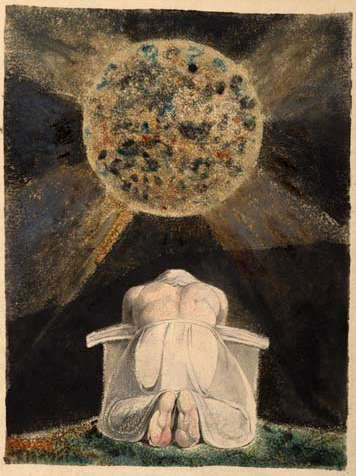
William Blake "The Song of Los"
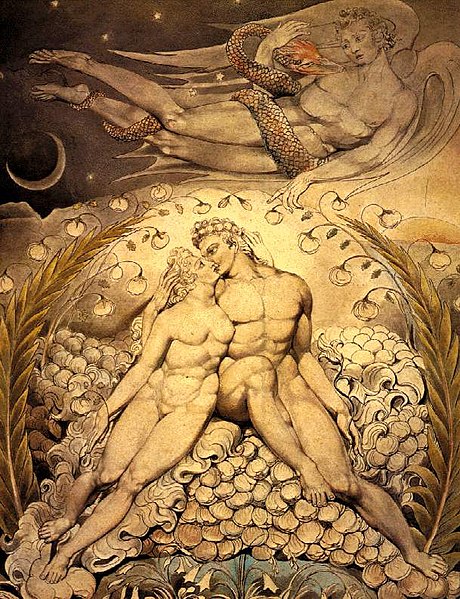
William Blake's "Sata Amor Adao Eva"
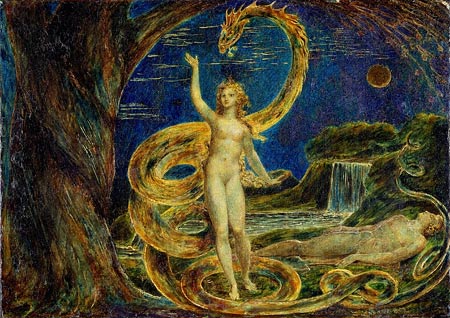
William Blake's "Eve Tempted by the Serpent"
From what I understand of Blake, he didn't subscribe to the idea that Jesus was
a "sacrifice." In the Laocoön engraving he wrote,
"Jesus and his Apostles and his Disciples were all Artists ... The Old and New
Testaments are the Great Code of Art. Art is the Tree of Life. God is Jesus."
When he says that God is Jesus, I take Blake to mean that Jesus is where
divinity and humanity intersect and become one. When he said of Jesus that "He
is the only God ... and so am I and so are you," Blake was agreeing with Muslim
Sufi mystics who claim to be one with God, and with Christian mystics who say
the same thing, and with the mystics and shamans of many other religions as
well. The best explanation I have heard of this common mystical belief is that
God is the great sea of unity and that each human being is like an individual
wave rising from that sea and collapsing back into it. While it seems unlikely
that anyone can "prove" this to be true, it is interesting that the idea recurs
over and over again around the globe and throughout time. So perhaps Blake was
correct to speak of "The Everlasting Gospel" and describe it as being unchanged
from greatest antiquity. For the mystic the Holy Trinity and a human family may
be one and the same: Father, Mother and Child. Due to the chauvinism of the
writers of the Bible, the female member of the Trinity (the Hebrew word SHEKHINA
is feminine) was virtually written out of existence, becoming the oddly but
perhaps aptly named "Holy Ghost." Blake also denied that Mary was a virgin,
which wasn't a problem for him because he considered sex to be good, not a
"sin."
When Blake criticized the orthodox Christian vision of Jesus, he did so with "an imagination and
excessiveness that has rarely been matched." Blake's Jesus was not a moralizing
preacher, philosopher or savior, but "the
very embodiment of the poetic" and a "supremely creative being above rigid
dogma, above harsh logic, above even morality. Jesus explodes from the pages of
Blake's poetry with a fierce apocalypticism far removed from the eminently
rational Enlightenment Jesus." Blake's Jesus "becomes more than just a thinker
or a moralizer, he becomes a symbol of being, of the vital and non-dualistic
relationship between divinity and humanity." These opening lines from "The
Everlasting Gospel" illustrate Blake's extreme distaste for what orthodoxy had
done to the reputation of Jesus Christ:
The Everlasting Gospel
THE VISION OF CHRIST that thou dost see
Is my vision’s greatest enemy.
Thine has a great hook nose like thine;
Mine has a snub nose like to mine.
Thine is the Friend of all Mankind;
Mine speaks in parables to the blind.
Thine loves the same world that mine hates;
Thy heaven doors are my hell gates.
Socrates taught what Meletus
Loath’d as a nation’s bitterest curse,
And Caiaphas was in his own mind
A benefactor to mankind.
Both read the Bible day and night,
But thou read’st black where I read white.
With Blake's imaginative reinterpretation of Milton, Satan, Jesus, the Bible and
Christianity, an English
"Romantic" movement began to form and soon expressed itself: primarily through poetry,
prose and art. England managed to avoid the more violent extremes of the
American and French Revolutions, but the desire for freedom and equality burned
just as heatedly in English breasts as it did in those of Americans and
Frenchmen. So it's not surprising that England produced six of its greatest
poets within a relatively short period of time: first Blake, then Wordsworth,
Coleridge, Byron, Shelley and Keats. Each of the six seemed to coin a new, man-centric religion. Each of the six was
to some degree a heir of Blake's
reinterpreted Milton. Within a few years, other strikingly unique voices would
emerge, chief among them Walt Whitman, a romantic poet-prophet in the vein of
Blake. Like Blake, Whitman was a mystic, with a belief in the "oneness" and equality of
all life. Blake seems
to have made a definite impression on Whitman, as Whitman had his death-crypt
modeled after Blake's "Death's Door" ...
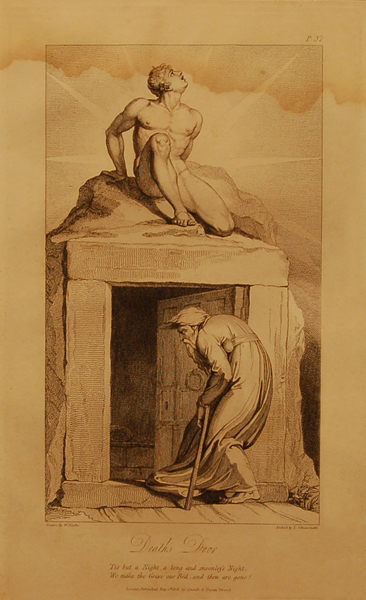
William Blake "Death's Door"
Blake, the First Poet of Equality
Equality is a staggering concept. Perhaps Blake intuitively "got" it before most
of his contemporaries. Equality is counter-intuitive because there is no
equality in the wild. In a pride of lions the dominant male gets the choicest
meat and a harem of females. Even among herbivores the stronger males often dominate,
drive off or kill the weaker males.
But something fundamental had begun to change in human society: perhaps man had
overcome his environment to such an extent that the rules of nature were no
longer necessary. And if all human beings are "created equal," then
obviously kings, lords, clergy and businessmen have no right to use and abuse women and
children. A monumental "sea change" was about to take place, in the way Western
nations judged the people in power. In the past, a king might have been judged, to
some degree, by how he treated the men who "mattered." But after Blake and the
Romantics shook the foundations of the world, the people in power would also be
judged by how they treated women, children, serfs and slaves. While it would
take some time for the change to "take hold" (and indeed there is still
a good degree of "slippage"
today, as some Western nations still resist giving fully equal rights to
non-heterosexuals and Muslims), the suddenness of the change in the way poets
thought can quite easily be discerned in the work of Blake, Whitman and their
heirs.
Blake, the First Romantic
English romanticism, which seems to have found its initial focus, energy and
drive in Blake, has been defined as "The tendency to cultivate an inner gaze;
subjectivity, egotism, withdrawal. This approach is characterized by
introspection, a searching inwardness of thought and imagery, and a transference
of authority from the external world of forms and legality to the inner world of
self-consciousness, private will, and spiritual power. Romantics are intensely
personal, drawing on the writer's private experience, with a profoundly
biographical element. Knowledge of the poet's life and personality can thus be
critically relevant to understanding the work, more true than for other writers. The inward gaze is curiously qualified by
[the Romantic] being a
revolutionary and reformer, at least during the term of greatest creativity.
Along with their more subjective works, the Romantics tended to produce
political tracts as part of a general commitment to the moral regeneration of
mankind. Several of these poets eagerly sought the center of the public stage in
an historical moment of great drama and great danger. Whether political or not,
the writers all manifested a faith in the ultimate regeneration of mankind." By this definition songwriters like Lennon and Dylan are clearly
Romantics, and thus heirs of Blake. Like Blake, they would readily agree that any state or
religion that oppresses minorities, women and children must be forcefully
criticized and opposed.
Blake, the Child Advocate
Many children of Blake's time were treated like indentured servants, or
worse. For instance, in those dark days chimneys had to be cleaned, and since small
children were better able to squeeze into narrow chimneys than adults, unscrupulous
businessmen gave children as young as four the dirty, dangerous, sometimes-deadly task of inserting themselves into chimneys and slowly working their way upwards to
clean them. At the very best they would breathe in noxious fumes, coal dust and
ash; if they were really unlucky they might fall to be crippled or die. Very
young children were also forced to work grueling hours (up to 16 hours per day)
at highly dangerous mines and factories. Even if they weren't crippled or killed, they
had scant time or energy to learn or play. The majority of children who
worked in mines would die before reaching age 25.
William Blake was a penniless, powerless poet. What could he
possibly do about such horrors? What he did was quite simple: he wrote very
touching, very tender, very moving poems about the plight of the children of his
day. As we read
his poems together, please imagine what Blake might write today, if he saw
what the allegedly "great" nations of Israel, England and the United States have done to the
children of Gaza ...
![[Blake Print - Songs of Innocence]](images/William%20Blake%20Songs%20of%20Innocence.jpg)
William Blake's "Songs of Innocence"
Songs of Innocence: The Chimney Sweeper
When my mother died I was very young,
And my father sold me while yet my tongue
Could scarcely cry 'weep! 'weep! 'weep! 'weep!
So your chimneys I sweep, and in soot I sleep.
There's little Tom Dacre, who cried when his head,
That curled like a lamb's back, was shaved: so I said,
"Hush, Tom! never mind it, for when your head's bare,
You know that the soot cannot spoil your white hair."
And so he was quiet; and that very night,
As Tom was a-sleeping, he had such a sight,―
That thousands of sweepers, Dick, Joe, Ned, and Jack,
Were all of them locked up in coffins of black.
And by came an angel who had a bright key,
And he opened the coffins and set them all free;
Then down a green plain leaping, laughing, they run,
And wash in a river, and shine in the sun.
Then naked and white, all their bags left behind,
They rise upon clouds and sport in the wind;
And the angel told Tom, if he'd be a good boy,
He'd have God for his father, and never want joy.
And so Tom awoke; and we rose in the dark,
And got with our bags and our brushes to work.
Though the morning was cold, Tom was happy and warm;
So if all do their duty they need not fear harm.
Songs of Experience: The Chimney Sweeper
A little black thing in the snow,
Crying "'weep! 'weep!" in notes of woe!
"Where are thy father and mother? Say!"
"They are both gone up to the church to pray."
"Because I was happy upon the heath,
And smiled among the winter's snow,
They clothed me in the clothes of death,
And taught me to sing the notes of woe."
"And because I am happy and dance and sing,
They think they have done me no injury,
And are gone to praise God and his priest and king,
Who make up a heaven of our misery."
Blake wrote one collection of poems called Songs of Innocence, and
another called Songs of Experience. The poems of the first collection
look at the world from the vantage of childish innocence, while the poems of the
second collection view the same world through the eyes of experience. In both
poems above we can feel Blake's tender empathy for suffering children.
In both poems the child chimneysweeps are so young they can't pronounce the "s"
in "sweep" and so mispronounce their job titles. If the first poem seems
hopeful, it may be simply because children are inclined to be hopeful, due to
their innocence. The second poem is much darker and we sense Blake's fury with
religious people who go to church and "pray" while innocent children suffer and
die. What would he make of Jews and Christian today, who go to churches and
synagogues, and endlessly read and study the Bible, but don't know better than to allow the children of Gaza to suffer and
die needlessly? I have no doubt that he would think as little of them as he did of the
slavemasters who used and abused children in the "jolly old England"
of his day.
Here are two more poems from the same collections:
Songs of Innocence: Holy Thursday
'Twas on a Holy Thursday, their innocent faces clean,
The children walking two & two, in red & blue & green,
Grey-headed beadles walk'd before, with wands as white as snow,
Till into the high dome of Paul's they like Thames' waters flow.
O what a multitude they seem'd, these flowers of London town!
Seated in companies they sit with radiance all their own.
The hum of multitudes was there, but multitudes of lambs,
Thousands of little boys & girls raising their innocent hands.
Now like a mighty wind they raise to heaven the voice of song,
Or like harmonious thunderings the seats of heaven among.
Beneath them sit the aged men, wise guardians of the poor;
Then cherish pity, lest you drive an angel from your door.
Songs of Experience: Holy Thursday
Is this a holy thing to see,
In a rich and fruitful land,
Babes reduced to misery,
Fed with cold and usurous hand?
Is that trembling cry a song!
Can it be a song of joy?
And so many children poor,
It is a land of poverty!
And their sun does never shine.
And their fields are bleak & bare.
And their ways are fill'd with thorns
It is eternal winter there.
For where-e'er the sun does shine,
And where-e'er the rain does fall:
Babe can never hunger there,
Nor poverty the mind appall.
The "Holy Thursday" of Songs of Innocence describes
the celebration of the ascension of Jesus. On this day, children from the charity schools of
London were marched to a service at St. Paul's Cathedral. The beadles were the
men in charge of keeping order. In the last
stanza of the poem, the children are singing in the balcony and the beadles
are seated below them. The final line is an allusion to Hebrews 13:2, "Be not
forgetful to entertain strangers: for thereby some have entertained angels
unawares."
The "Holy Thursday" from Songs of Experience describes the same ceremony.
When Blake says "It is eternal winter there," he seems to be saying that a
church that denies innocent children food
and a decent life is utterly lacking in light and warmth.
Here are two more poems from the same collections:
Songs of Innocence: The Lamb
Little Lamb, who made thee?
Dost thou know who made thee?
Gave thee life & bid thee feed,
By the stream & o'er the mead;
Gave thee clothing of delight,
Softest clothing, wooly, bright;
Gave thee such a tender voice,
Making all the vales rejoice?
Little Lamb, who made thee?
Dost thou know who made thee?
Little Lamb, I'll tell thee,
Little Lamb, I'll tell thee:
He is called by thy name,
For he calls himself a Lamb.
He is meek & he is mild;
He became a little child.
I a child & thou a lamb.
We are called by his name.
Little Lamb, God bless thee!
Little Lamb, God bless thee!
Songs of Experience: The Tyger
Tyger Tyger, burning bright,
In the forests of the night;
What immortal hand or eye,
Could frame thy fearful symmetry
In what distant deeps or skies.
Burnt the fire of thine eyes!
On what wings dare he aspire?
What the hand, dare seize the fire!
And what shoulder, & what art.
Could twist the sinews of thy heart?
And when thy heart began to beat,
What dread hand! & what dread feet!
What the hammer! what the chain,
In what furnace was thy brain
What the anvil, what dread grasp,
Dare its deadly terrors clasp!
When the stars threw down their spear
And water'd heaven with their tears:
Did he smile his work to see
Did he who made the Lamb make thee!
Tyger Tyger burning bright,
In the forests of the night:
What immortal hand or eye,
Dare frame thy fearful symmetry!
"The Lamb" from Songs of Innocence is highly symbolic. The lamb simultaneously symbolizes innocence, a human child, and Jesus.
"The Tyger" symbolizes experience, an adult and perhaps the Anti-Christ. A predator kills constantly. The poem asks the question: "Did he
who made the lamb make thee!" but with an exclamation mark rather than a question mark. Blake may be asking: are the men who inflict such suffering on
innocent children even human? He may have found it difficult to reconcile his humanity to the inhumanity of men capable of such brutality and
utter disregard for the suffering of innocents.
Here are two more poems from the same collections:
Songs of Innocence:
The Divine Image
To Mercy, Pity, Peace, and Love
All pray in their distress;
And to these virtues of delight
Return their thankfulness.
For Mercy, Pity, Peace, and Love
Is God, our father dear,
And Mercy, Pity, Peace, and Love
Is Man, his child and care.
For Mercy has a human heart,
Pity a human face,
And Love, the human form divine,
And Peace, the human dress.
Then every man, of every dime
That prays in his distress,
Prays to the human form divine,
Love, Mercy, Pity, Peace.
And all must love the human form,
In heathen, turk, or jew;
Where Mercy, Love & Pity dwell
There God is dwelling too.
Songs of Experience: The Human Abstract
Pity would be no more,
If we did not make somebody Poor:
And Mercy no more could be,
If all were as happy as we;
And mutual fear brings peace;
Till the selfish loves increase.
Then Cruelty knits a snare,
And spreads his baits with care.
He sits down with holy fears,
And waters the ground with tears:
Then Humility takes its root
Underneath his foot.
Soon spreads the dismal shade
Of Mystery over his head;
And the Catterpiller and Fly,
Feed on the Mystery.
And it bears the fruit of Deceit,
Ruddy and sweet to eat;
And the Raven his nest has made
In its thickest shade.
The Gods of the earth and sea,
Sought thro' Nature to find this Tree
But their search was all in vain:
There grows one in the Human Brain
"The Divine Image" of Songs of Innocence attributes the virtues of
Mercy, Pity, Peace, and Love to the human form and says that where these virtues
exist, "there God is dwelling too." Blake thus makes the point that if God dwells in every human being,
racism is nonsensical.
"The Divine Image" of Songs of
Experience appeared in only one copy of Songs of
Innocence and Experience. Many critics and scholars believe this is because Blake
considered the better companion poem for "The Divine Image" to be "The Human Abstract."
"The Human Abstract" also attributes Pity and Mercy to the human form, but
suggests that we feel pity and practice mercy only after we have caused other
people to suffer. Once again Blake seems to criticize religion, this time for
creating "holy fears" (perhaps the fear of hell) and false humility. The result
is darkness (perhaps superstition and false teachings) and deceit. The origin of
such things is not God or Nature, but the "Human Brain," which produces bad
theology and uncompassionate, unjust religions.
Blake, the Abolitionist
Blake was at the forefront of the British abolitionist movement, not only in
opposing slavery, but also in advocating the equality of the races, as we shall see
in the following poem (the full poem follows the plates and is much easier to
read):
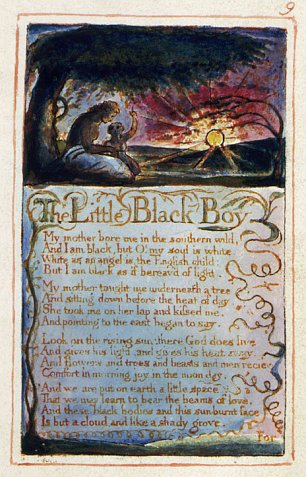
William Blake's "The Little Black Boy" (First Plate)
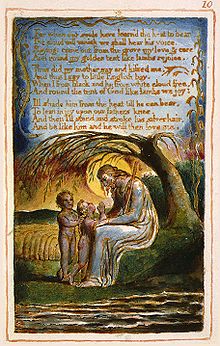
William Blake's "The Little Black Boy" (First Plate)
The Little Black Boy
My mother bore me in the southern wild,
And I am black, but O! my soul is white;
White as an angel is the English child,
But I am black, as if bereav'd of light.
My mother taught me underneath a tree,
And sitting down before the heat of day,
She took me on her lap and kissed me,
And pointing to the east, began to say:
Look on the rising sun: there God does live,
And gives his light, and gives his heat away;
And flowers and trees and beasts and men receive
Comfort in morning, joy in the noonday.
And we are put on earth a little space,
That we may learn to bear the beams of love;
And these black bodies and this sunburnt face
Is but a cloud, and like a shady grove.
For when our souls have learn'd the heat to bear,
The cloud will vanish; we shall hear his voice,
Saying: "Come out from the grove, my love & care,
And round my golden tent like lambs rejoice.''
Thus did my mother say, and kissed me;
And thus I say to little English boy:
When I from black and he from white cloud free,
And round the tent of God like lambs we joy,
I'll shade him from the heat, till he can bear
To lean in joy upon our father's knee;
And then I'll stand and stroke his silver hair,
And be like him, and he will then love me.
Blake also spoke clearly and forthrightly for equality between the races in his
visual art. He depicted the horrors of racism and slavery more graphically than he did
any other horrors ...
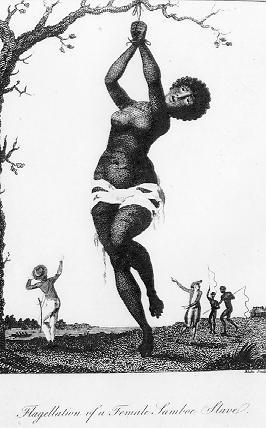
William Blake's "Flagellation of a Female Samboe Slave"
... but he seemed to go beyond that to "connect" the suffering of slaves with
the lot of suffering mankind, even poets, symbolized in the second image below by Los ...
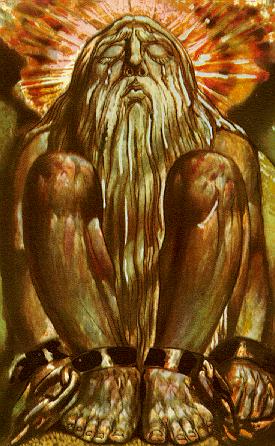
William Blake's "Urizen in Fetters, Tears streaming from His Eyes"
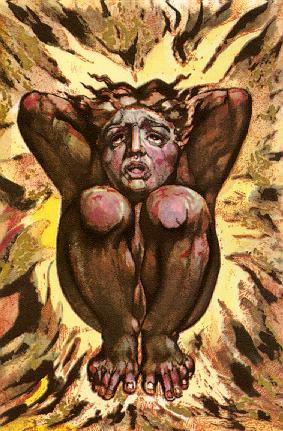
William Blake's "Los, Symbol of Poetic Genius, Consumed by Flames"
Blake and other early Romantic poets including William Wordsworth, Samuel Taylor
Coleridge and Robert Southey, opposed slavery. In 1796 John Gabriel Stedman, a
mercenary, published his memoirs of a five-year expedition against ex-slaves in
Surinam; his book included a number of engraved illustrations by Blake depicting
the horrifically cruel treatment of recaptured slaves. The first of these engravings has been "construed as an
explicit attack on the slave trade" because Blake depicted "the skulls of the
murdered slaves looking out over the sea to a slave ship in the distance while
the most recent victim of plantation cruelty swings on the gallows in the
foreground." These images were unique at that time for their graphic depiction of human suffering.
Stedman's book and Blake's illustrations became part of abolitionist literature.
According to the "William Blake Biography" the poet was a "prophet against empire" who opposed slavery
"over the course of his lifetime." Through his poetry and art "he was able both to counter pro-slavery propaganda
and to complicate typical abolitionist verse and sentiment with a profound and unique exploration of the effects
of enslavement and the varied processes of empire."
According to the same biography, Blake's Visions of the Daughters of Albion (1793) "explores the psychologically
damaging effects of enslavement upon its victims and also caricatures the political debate over
abolition in Britain. The triangular relationship between Oothoon the female
slave, Bromion the slave-driver, and Theotormon the jealous but inhibited former
lover, depicts the sufferings of those subjugated by the trade itself and mimics
the position of the pro-slavery, vested-interest lobby and that of wavering
abolitionists [who opposed slavery in theory without strongly opposing its
actual practice] ..."
The biography concludes: "Blake was among the few British writers
who actively advocated slave rebellion and believed that it was at the edges of
empire that true revolutions would occur."
Blake, the Mystic
Blake was perhaps the most spiritual and mystical of English poets. He recorded having
visions of angels and said that he saw and conversed with the angel Gabriel, Mary, and various historical figures. At age four he had a vision of God
looking at him through a window. Around age nine he had a vision of "a tree
filled with angels, bright angelic wings bespangling every bough like stars." On
another occasion, Blake "watched haymakers at work and thought he saw angelic
figures walking among them." Blake also believed that he was personally
instructed and encouraged by Archangels.
In a letter to John Flaxman, dated 21 September 1800, Blake wrote: "[The town
of] Felpham is a sweet place for Study, because it is more spiritual than
London. Heaven opens here on all sides her golden Gates; her windows are not
obstructed by vapours; voices of Celestial inhabitants are more distinctly
heard, & their forms more distinctly seen; & my Cottage is also a Shadow of
their houses. My Wife & Sister are both well, courting Neptune for an embrace...
I am more famed in Heaven for my works than I could well conceive. In my Brain
are studies & Chambers filled with books & pictures of old, which I wrote &
painted in ages of Eternity before my mortal life; & those works are the delight
& Study of Archangels."
In a letter to Thomas Butts, dated 25 April 1803, Blake wrote: "Now I may say to
you, what perhaps I should not dare to say to anyone else: That I can alone
carry on my visionary studies in London unannoy'd, & that I may converse with my
friends in Eternity, See Visions, Dream Dreams & prophecy & speak Parables
unobserv'd & at liberty from the Doubts of other Mortals; perhaps Doubts
proceeding from Kindness, but Doubts are always pernicious, Especially when we
Doubt our Friends."
In some of his more mystical passages Blake wrote:
"To see a world in a grain of sand
And heaven in a wild flower
Hold infinity in the palm of your hand
And eternity in an hour."
"If the doors of perception were cleansed
everything would appear to man as it is:
Infinite."
"He who binds to himself a joy,
Does the winged life destroy;
He who kisses the joy as it flies,
Lives in Eternity's sun rise."
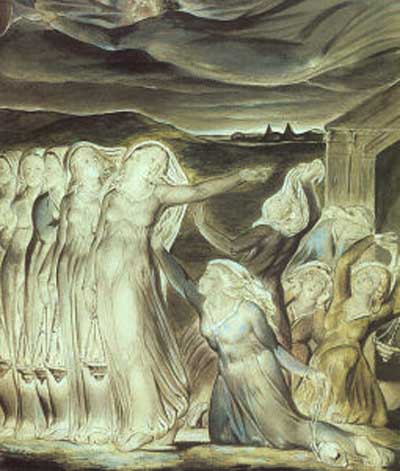
William Blake's "The Parable of the Wise & Foolish Virgins"
Blake, the Genius
According to Jonathan Jones, art critic for The Guardian, Blake is "far
and away the greatest [visual] artist Britain has ever produced." Blake has also
been included among the top forty artists of all time by G. Fernández and has
been called one of the greatest artists by John Ruskin, John Maynard, Henry
Fuseli, John Flaxman, Alexander Gilchrist and Ita Marguet, among others. Harold
Bloom, perhaps the best-known of modern literary critics, included Blake in his
list of the 100 greatest geniuses of all time, calling him a visionary akin to
Dante, Milton and Shelley. But perhaps the best measure of the genius of William
Blake is his influence on other poets and artists, including especially the
Romantics, and through them the Modernists and Post-Modernists. William
Wordsworth, the leading figure among the early Romantics, offered this verdict
after Blake's death: "There was no doubt that this poor man was mad, but there
is something in the madness of this man which interests me more than the sanity
of Lord Byron and Walter Scott."
Blake might be considered the first major Romantic poet, because he
combined imagination and individuality with contempt for mindless orthodoxy. He
was a modern Prometheus, shaking off the chains of orthodoxy and
authoritarianism, to seek the holy inner fire of passionate imagination.
Blake, the Forerunner of Whitman
Blake's "long, flowing lines and violent energy, combined with aphoristic
clarity and moments of lyric tenderness" heralded the free verse of poets like
Whitman. Where poets of the past had been poets of form and
precision, Blake was a poet of freer-flowing energy, passion and imagination. After Blake,
poets like Alexander Pope would often seem conventional and dull, for all their
talent, skill and dexterity. Blake raised the bar by caring deeply about his
subjects, and by requiring his readers to care and respond passionately in return.
Blake's Influence on other Artists
Blake also influenced the pre-Raphaelites, Allen Ginsburg and the
Beat poets, the Underground Movement, the "counter culture," Percy Bysshe
Shelley, Algernon Charles Swinburne, James Joyce, W. B. Yeats, T. S. Eliot, C.
S. Lewis, Bob Dylan, Patti Smith, U2, Salman Rushdie, Phillip Pullman ("His Dark
Materials"), Orson Scott Card, et al. The modern graphic novel can clearly trace its
roots to Blake's illuminated poems and prophetic books. And it seems likely that
every major anti-war and anti-orthodoxy figure since Blake has been influenced
to some degree by him.
Jim Morrison based the name of his rock group, the Doors,
on Blake's "doors of perception."
Bob Dylan collaborated with Allen Ginsberg to record two Blake songs. Ginsberg
even claimed that Blake's spirit had communicated musical settings of several Blake poems
to him. In 1948 he had an auditory hallucination of Blake reading his poems "Ah,
Sunflower," "The Sick Rose," and "Little Girl Lost" (later referred to as his
"Blake vision"). Patti Smith was heavily influenced by Blake, referring to him
in her song "My Blakean Year" and also reciting his poetry
before some of her songs.
William Rossetti called Blake a "glorious luminary," and described him as "a man
not forestalled by predecessors, nor to be classed with contemporaries, nor to
be replaced by known or readily surmisable successors."
Blake, the Advocate of Women and Free Love
In 1793's Visions of the Daughters of Albion, Blake "condemned the
cruel absurdity of enforced chastity and marriage without love and defended the
right of women to complete self-fulfillment." He abhorred the black-robed
priests of organized religion who erected a "Thou shalt not" sign over his
garden of earthly love ...
The Garden Of Love
by William Blake
I laid me down upon a bank,
Where Love lay sleeping;
I heard among the rushes dank
Weeping, weeping.
Then I went to the heath and the wild,
To the thistles and thorns of the waste;
And they told me how they were beguiled,
Driven out, and compelled to the chaste.
I went to the Garden of Love,
And saw what I never had seen;
A Chapel was built in the midst,
Where I used to play on the green.
And the gates of this Chapel were shut
And "Thou shalt not," writ over the door;
So I turned to the Garden of Love
That so many sweet flowers bore.
And I saw it was filled with graves,
And tombstones where flowers should be;
And priests in black gowns were walking their rounds,
And binding with briars my joys and desires.
Blake, the Inventor
Blake was the inventor of relief etching, or illuminated printing, a method he
used to produce most of his books, paintings, pamphlets and poems. He also
employed intaglio engraving, most notably for the illustrations of the Book of
Job.
Blake, the Anarchist
Blake's trouble with authority came to a head in August 1803, when he was
involved in a physical altercation with a soldier called John Schofield. Blake
was charged not only with assault, but also with uttering seditious and
treasonable expressions against the King. Schofield claimed that Blake had
exclaimed, "Damn the king. The soldiers are all slaves." Blake would be cleared
in the Chichester assizes of the charges. According to a report in the Sussex
county paper, "The invented character of [the evidence] was ... so obvious that
an acquittal resulted." Schofield was later depicted wearing "mind forged
manacles" in an illustration to Jerusalem.
Blake revolted against the established institutions of his time, saying:
"Prisons are built with stones of Law, brothels with bricks of Religion."
He sided with the rebellious fallen angels of Milton's "Paradise Lost" and
attacked conventional religious views, particularly those that called sex "evil"
and thus opposed human happiness. Some of Blake's contemporaries called
him a harmless lunatic, but by advocating free love and opposing misery-inducing
religious orthodoxy, he was simply light years ahead of his time. In Blake's
case it
seems madness really is "divinest sense."
Blake, the Prophet of Freedom and Tolerance
One of Blake's lifelong concerns was to free the soul and its natural energies from
the hidebound "reason" of organized religion. He hated the grimy, sooty effects
of the Industrial Revolution in England and looked forward to the establishment
of a New Jerusalem "in England's green and pleasant land." His personal religion was
freedom, tolerance and the pursuit of happiness, without artificial limitations
and impediments. To him, religious orthodoxy was like a speed bump in the middle
of racetrack. He had a heart of all human suffering. But perhaps his greatest
enduring legacy is his tender empathy for
children, and his fierce, passionate defense of them.
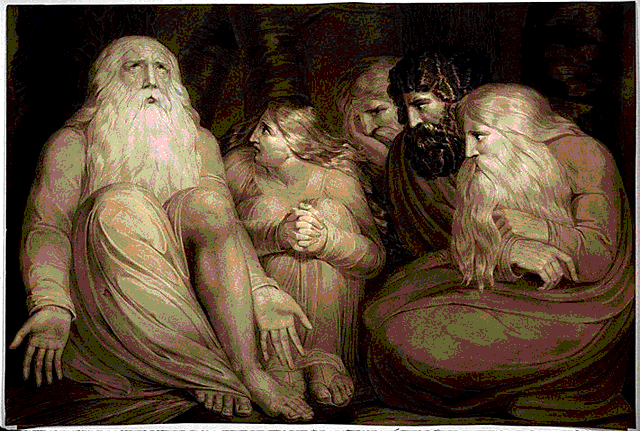
William Blake's "Job"
Additional Information on the Continuing Influence of William Blake
Here's additional information for anyone interested in the continuing influence
of William Blake on modern poets and songwriters. I'll begin with myself, since
I have an interesting, at times mystical, tale to tell ...

William Blake's "Ancient of Days"
When I decided to go into business for myself and incorporate, I had to come up
with a name for my computer software company. I selected the name "Alpha Omega" and the
slogan "The beginning and the end of your search for hardware, software,
programming, training and support." I needed a logo, so I chose a pyramid
(Alpha) with a sun (Omega):

This was years before I created the HyperTexts and chose Blake's
"Ancient of Days" as the site's frontispiece (at that time I knew Blake's poetry
but wasn't familiar with his art, and didn't realize that he was the artist). It was
years later that I noticed the similarity between the two images above.
And both images seem to "lead" to the All-Seeing Eye (the Eye of Providence
or the Great Architect), if
the "sun" continues its descent and drops into the pyramid:
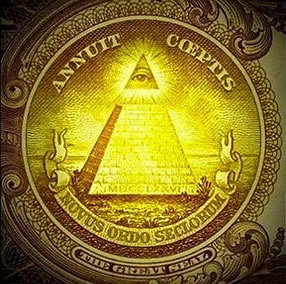
No, I am not a Freemason or an Occultist! Nor am I particularly "big" on
numerology, or symbology. I just find the coincidences interesting. Albert
Einstein said that coincidence is how God reveals himself. In any case, the image
directly above seems to relate to Blake, as the "eye in the capstone" represents
God/Divinity/the Soul entering the Body/World/Matter. This is how Blake seemed
to see Christ: as the "intersection" of divinity and humanity. The All-Seeing Eye has
also been described as the Eye of the Great Architect, or Creator. The three
images above also seem to relate to the ancient Egyptian "Eye of Horus"
hieroglyph:
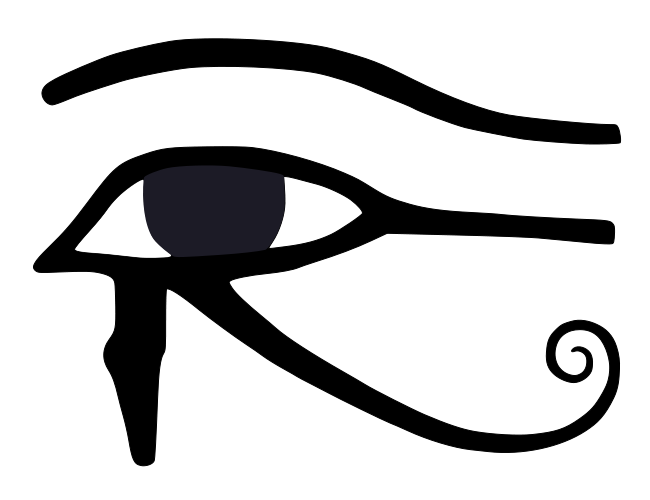
Horus was the original "Christ" and many of the miracles attributed to Jesus
(such as being born of a virgin, walking on water, calming a storm, feeding the
multitudes, restoring sight to the blind, casting out demons, raising the dead,
dying and returning to life on the third day, etc.) had all been attributed to Horus
many centuries before Jesus was born. There are many other interesting parallels between
Jesus and Horus, such as both being immersed by a Baptizer who was later
beheaded! What are the odds? The original Trinity consisted of Osiris (the father god), Isis (the
virginal mother god) and Horus (the son of God).
The story about Jesus raising Lazarus from the dead is of particular interest,
because El is a Hebrew name for God (as in Israel, Michael, Gabriel, etc.) and
the name Lazarus is probably a translated version of El-Osiris. In Aramaic El-Osiris
becomes El-Asar. When the Greek suffix "us" is added to designate a male name
(as in Dionysus, Zeus, Theseus, etc.), the result is El-Asar-us, or Lazarus. In
the Egyptian version of the story Horus (the rising sun/son) resurrects Osiris
(the setting sun) and in a sense the father and son are one. In the Christian
version of the story, Lazarus becomes a friend of Jesus for rather obvious
theological reasons. When Jesus was elevated to the position of the son of God
and a solar deity like Horus, his birthday became December 25th: the winter
solstice (the day the sun is "resurrected" and the days begin to lengthen,
heralding spring). So when Blake spoke of an "everlasting gospel" that was
unchanged from antiquity, he wasn't just "whistlin' Dixie."
It's also interesting that the names Isis and Mary seem to be associated, as
ancient Egyptian inscriptions mention Aset-Meri (Isis Beloved):
Furthermore, the foster-father of Horus was Seb, or Seph. The name Jo-Seph is a
combination of Jo/Jah/Yah (meaning "God" as in Yahweh) and Seph. The name Jo-seph
means "God increases." So it seems the name of the foster-father of Jesus was
constructed by "adding" the prefix for God to the name of Horus's foster-father!
William Blake helped me immensely at a time in my life when I began to question
what adults had brainwashed me to believe from my toddlerhood. For a child it's
terrifying to be told, "Believe that God is an unjust monster, a Nobodaddy, or
you'll burn in hell for all eternity," especially when the child is handed a
Bible and reads it from cover to cover, as I did when I was a young boy. I was a
gifted reader, and like Mark Twain I wasn't much troubled by the parts of the
Bible I didn't understand: it was the parts I understood all too well that
knocked me for a loop. Reading Blake and other romantic poets like Burns, Shelley and
Whitman helped me to free myself from all the vile crap that had been rammed down
my throat when I was a child.
I used to attend a Southern Baptist Church, but I became convinced that its
teachings were not only nonsensical, but evil. One day I picked up the Baptist
Hymnal and for some reason suddenly wondered what the last hymn in the book might be. To
my astonishment, the last hymn in the Baptist Hymnal was number 666! Soon
thereafter I discovered that the Bible sponsored by the Southern Baptist
Convention (the Holman Christian Standard Bible, or HCSB) didn't contain the
word "hell" in its entire Old Testament, or in any of the epistles of Paul, or
in the book of Acts (ostensibly the self-recorded history of the early Christian
church), or in two of the four gospels. Had an all-wise God forgotten to tell
most of the writers of the Bible about a place called "hell," or did a few
diabolical "theologians" insert "hell" into the Bible very clumsily at the last
minute? If the thought of "hell" troubles you, please consider reading my
simple, logical proof that there is
No Hell in the Bible.
I left the church and have never returned. But then one day something quite
mysterious happened. My mother told me that a friend of hers had found a Baptist
Hymnal (ironically) at the city dump. When she showed me the hymnal, the last hymn was no
longer number 666, because she had hand-written the words to one of her favorite
hymns on the last page. The hymn was Blake's "Jerusalem" ...
Jerusalem
And did those feet in ancient time
Walk upon England's mountains green?
And was the holy Lamb of God
On England's pleasant pastures seen?
And did the Countenance Divine
Shine forth upon our clouded hills?
And was Jerusalem builded here
Among these dark Satanic mills?
Bring me my bow of burning gold:
Bring me my arrows of desire:
Bring me my spear: O clouds unfold!
Bring me my chariot of fire.
I will not cease from mental fight,
Nor shall my sword sleep in my hand
Till we have built Jerusalem
In England's green and pleasant land.
Bob Dylan
A song of Bob Dylan's, evidently written under the influence
of William Blake, is titled "Every Grain of Sand." It was written during what is
known as Dylan's "Christian period." It contains echoes of "Auguries of
Innocence" and "Jerusalem."
AUGURIES OF INNOCENCE
by William Blake
To see a World in a Grain of Sand
And a Heaven in a Wild Flower
Hold Infinity in the palm of your hand
And Eternity in an hour
A Robin Red breast in a Cage
Puts all Heaven in a Rage
A Dove house filld with doves & Pigeons
Shudders Hell thro all its regions
A dog starvd at his Masters Gate
Predicts the ruin of the State ...
EVERY GRAIN OF SAND
by Bob Dylan
In the time of my confession, in the hour of my deepest
need
When the pool of tears beneath my feet flood every
newborn seed
There's a dyin' voice within me reaching out somewhere
Toiling in the danger and in the morals of despair
Don't have the inclination to look back on any mistake
Like Cain, I now behold this chain of events that I must
break
In the fury of the moment I can see the Master's hand
In every leaf that trembles, in every grain of sand
Oh, the flowers of indulgence and the weeds of
yesteryear
Like criminals, they have choked the breath of
conscience and good cheer
The sun beat down upon the steps of time to light the
way
To ease the pain of idleness and the memory of decay
I gaze into the doorway of temptation's angry flame
And every time I pass that way I always hear my name
Then onward in my journey I come to understand
That every hair is numbered like every grain of sand
I have gone from rags to riches in the sorrow of the
night
In the violence of a summer's dream, in the chill of a
wintry light
In the bitter dance of loneliness fading into space
In the broken mirror of innocence on each forgotten face
I hear the ancient footsteps like the motion of the sea
Sometimes I turn, there's someone there, other times
it's only me
I am hanging in the balance of the reality of man
Like every sparrow falling, like every grain of sand
Copyright © 1981 by Special Rider Music
The song is "perhaps his most sublime work to date," writes Dylan biographer Clinton Heylin, who calls it "the summation of a number of attempts to express what the
promise of redemption meant to him personally. One of his most intensely
personal songs, it also remains one of his most universal. Detailing 'the time
of my confession/the hour of my deepest need,' the song marks the conclusion of
his evangelical period as a songwriter, something its position at the conclusion
of Shot of Love tacitly acknowledges."
Walt Whitman
Blake's “Visions of the Daughters of Albion” bears similarities to sections of
Walt Whitman's Leaves of Grass ...
With what sense is it the chicken shuns the
ravenous hawk?
With what sense does the tame pigeon measure out
the expanse?
With what sense does the bee form cells? Have not the mouse and frog
Eyes and ears and a sense of touch? Yet are their habitations.
And their pursuits, as different as their forms and as their joys:
Ask the wild ass why he refuses burdens: and the meek camel
Why he loves man: is it because of eye ear mouth or skin
Or breathing nostrils? No for these the wolf and
tyger have.
Ask the blind worm the secrets of the grave, and why her spires
Love to curl round the bones of death; and ask the rav'nous snake
Where she gets her poison: and the wing'd eagle why he loves the sun
And then tell me the thoughts of man, that have been hid of old.
Both poets employ non-rhyming verse. Both poets employ catalogues of natural
objects and their attributes. Both poets see unity and diversity in nature.
Enslav'd, the daughters of Albion weep a trembling
lamentation
Upon their mountains; in the valleys. Sighs toward
America.
For the soft soul of America, Oothoon wandered in Woe ...
Both poets abhorred the
injustices of slavery, racism and sexism. Both poets were advocates of what we
moderns now call "free love."
And trees. & birds. & beasts. & men. Behold their
eternal joy.
Arise you little glancing wings, and sing your infant
Joy!
Arise and drink your bliss, for every thing that lives
is Holy!
Blake and Whitman were mystics who believed in the oneness and holiness of all
life. While they despaired of the injustices they saw, they seemed to also see
beyond those injustices, into a dimension where innocence, joy and bliss were
possible.
It's difficult to say whether Whitman read Blake and was influenced by him, or if
they developed independently as writers but through some (perhaps mystical)
process came to share similar ideas in a number of areas. But in any case they
did seem very much alike in their tenderness, their compassion, their rejection
of the idea that extramarital sex was evil, and their distaste for bigotry,
intolerance and religious dogma.
Related pages: The Best Poems and
Art of William Blake, William
Blake's Children, William Blake's
Angels, William Blake's God,
William Blake's Jesus Christ,
William Blake's
Genius and Originality,
William Blake's "Broken Love"
The HyperTexts
![[Blake Print - Hecate]](images/William%20Blake%20Hecate.jpg)

![[Blake Print - Hecate]](images/William%20Blake%20Hecate.jpg)


![[Blake Print - Angels Hovering Over the Body of Jesus in the Sepulchre]](images/William%20Blake%20Angels%20Hovering%20Over%20the%20Body%20of%20Jesus%20Christ.jpg)
![[Blake Print - Jacob's Ladder]](images/William%20Blake%20Jacobs%20Ladder.jpg)








![[Blake Print - Songs of Innocence]](images/William%20Blake%20Songs%20of%20Innocence.jpg)










